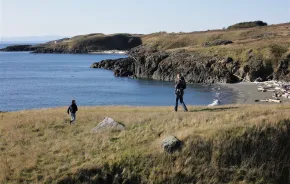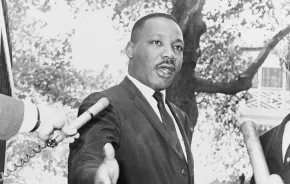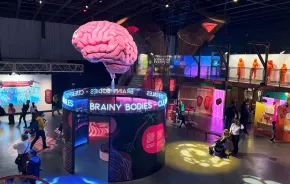
Each year, thousands of aspiring young dancers enter one of the world's most prestigious ballet competitions, the Youth America Grand Prix, where lifelong dreams are at stake. In the final round, with hundreds competing for only a handful of elite scholarships and contracts, focus, practice, and discipline are paramount.
Bess Kargman's award-winning documentary, First Position, follows six young dancers as they prepare for a chance to enter the world of professional ballet, struggling through bloodied feet, near exhaustion and debilitating injuries, all while navigating the drama of adolescence.
This beautifully lensed documentary will enjoy a limited-run engagement at Seven Gables Theatre in the University District beginning May 18. We seized a chance to preview the film and then interview Kargman about the making of the documentary and the world of youth ballet dancing.
First Position is an awe-inspiring film —congratulations! You did a wonderful job of showcasing a range of dancers with diverse backgrounds. Was that something that was very important to you?
One of my most important missions in making the film was to show how complex and interesting the ballet world is. I also wanted to choose characters who would challenge common misperceptions of the dance world. For example, not all ballet dancers are white, rich, and have psycho stage moms; not all boy ballet dancers are gay. I set out to cast this film very much like a narrative-film director would cast it. I also wanted to show how different the stakes are depending on your age. Ultimately, I wanted people who watch this film to look at it and think, “Oh my gosh, there’s someone who looks like me who does ballet!”
Because it’s a competition film, I thought that a good way to protect myself from an uncertain outcome was to choose dancers whose personal stories, lives, and personalities were so rich and unique that even if the last five minutes of the film didn’t go as I hoped they would, at least the first 85 minutes of the film would take the audience on this wonderful ride.
Speaking about their lives outside of dance, the film's subjects deal with such issues as immigration, adoption, and separation from friends and family, in addition to physical pain and all the drama of ballet. What was it like getting to know the dancers and their families — just as people?
I definitely didn’t predict how shy dancers could be! That was very scary. I’m a first-time director, so I had no history in filmmaking to say, “No, this happens all the time, don’t worry, we’ll work through it.” It made me really nervous, and then the one thing I realized was, well, you know, they’re not so shy when the cameras are off... And from that moment I realized, “Okay, we’re going to have to turn the cameras off and start bonding with them. ” I let them get to know me and I got to know them. From that point forward, they opened up and got comfortable with the camera, and it became a lot more natural. But at first, they were painfully shy.
I’m not a parent yet, I don’t have kids yet, and so these kids are the closest thing I have to babies. I feel very close to them. I really hope the film will do wonderful things for their careers. But, that said, I’m trained as a journalist. One really important thing I learned in school was to make sure you never cross a certain line. I always had to make sure to maintain certain boundaries, because, at the end of the day, I had to stay as objective as possible. I didn’t become their friend but I became to some a mentor. They all love the film — it was really important to me that they felt I portrayed them fairly and accurately.
With all the success of Black Swan, a horror film, and TLC’s Dance Moms, there has been no small amount of negative attention cast on the dance world. Were you worried about that?
I had to lobby to convince YAGP [Youth America Grand Prix] to let me film there. I had to meet with them, to present my ideas to the board. Their competition is prestigious enough that they don’t need a documentary to get the word out about it. They had to be convinced why they should open up their doors. What I told them was exactly what your question touches on: I told them I didn’t have an interest in making the film into a reality TV show. I didn’t want to create something that would make people regret that they signed a release or regret that they ever got involved. I guess I care too much about people’s feelings to create something where someone is absolutely devastated about the way they were portrayed. So I don’t think the competition would’ve allowed me to film if I said I’m going to make a reality TV show with a salacious, fighting, backstabbing story about how dark the ballet world is. That’s been done. I didn’t need to tell that story.
How did you decide to make this particular movie?
It’s actually a really interesting story. I was walking in Lower Manhattan and there were these huge banners for the YAGP finals. I’d heard about the competition and was really curious about it, so I snuck in and I got the last seat in the back — it was sold out. There was this itty-bitty ballerina performing. She was about 4’5”, teeny, about 60 pounds, and she was breathtaking. She had such artistry, poise, grace expression, and maturity. I’d never see anyone dance like that as an 11-year-old — never. I didn’t know who she was but she did this beautiful piece, curtsied, and walked off the stage. I walked out knowing this was the movie I wanted to make.
I knew the ballet world, as I’d grown up dancing. I felt like I could talk shop with the kids and I knew things about the ballet world that a more experienced director maybe wouldn’t know. So when I saw that little girl, I got goose bumps. I had no idea who she was, but I vowed that if I could convince the competition to let me shoot there that she would be in it.
 How can parents of young dancers help their children balance perseverance with healthy self-esteem — doing their best competitively while being happy with their level of performance?
How can parents of young dancers help their children balance perseverance with healthy self-esteem — doing their best competitively while being happy with their level of performance?
There are things about parenting that I haven’t had the opportunity to talk about yet, just because I haven’t been asked! Firstly, I’ll say that as much attention was paid to the parents when I was deciding who to feature in the film as to the kids. I made sure to meet all the parents before deciding who was going to be selected as central characters in the film, because that parent-child relationship is so fascinating to me. Especially in America, parental involvement is so essential to a young dancer’s upbringing and career. Without the support of parents or a guardian or a mentor, in America, there is no way you can make it as a dancer. So it was really important to me to get to know and understand the parents as individuals before I even set out to make the film.
For example, I think Satoko is such an important mother in the film because at first, she might come off like a "Tiger Mom." Then you hear her talking about how she’s perfectly aware of what others might possibly think about her, that she might be judged as being over-involved. But she doesn’t ever want to regret that she could’ve done more for her kids — and that’s why she is the way she is. People might assume one thing about her and suddenly they’re proven wrong.
The role the parents play is very different than the role the teachers play in these kids’ lives. There are certain stereotypes about stage parents, so I love the fact that the parents in the film defy those. No kid in the film is forced to do ballet. These parents are very involved, but it’s only because the kids demand that. It’s really the young dancers’ internal engines which are the drivers of this desire to make it as a ballet dancer — the parents fall into line after that.
What did you learn about parenting from the dancers' parents?
If and when I do become a parent, I’ve definitely been influenced by their example. It’s very, very easy to overdo it at a really young age and get burned out — it’s really common — and injuries are really common. It would make me very sad to meet a 10-year-old who’s already burnt out or had a major injury. In terms of what I’ve learned or advice for parents that I might be able to offer: At times, there were parents in the film who said, "You’ve already done three hours of ballet today, that’s it." Kids are so focused that they need a parent's guidance and perspective.
Also I think that the parents need to have a good working relationship with the coaches. It’s very stressful for the kids if the dynamic is strained between his or her parents and the teacher. That happens a lot in the ballet world. The kids who end up having a healthy relationship with themselves and with ballet are the ones who have healthy relationships with their teachers and their parents.
Did the kids talk about their plans for the future, after ballet?
When a dancer gets to about the age of 14, he or she has to decide between school and ballet training. I believe eventually they’ll all go to college, but the schedule of a professional dancer is so demanding that it’s not all that common for dancers to go to college while they’re dancing professionally. Either they have to do a night-school program or some of them wait until they retire and then they go to school. More and more actually are getting their college degree at the same time, but still it’s not extremely common.
I think that a lot of dancers are so focused on their careers that they don’t think about what they’re going to do when they’re 45. In some ways, it’s not even natural for them to be thinking about what they’re going to do after they "retire." That’s not what 17-year-olds think about — normally, at least. At the same time, starting a career so young kind of forces you to think about it.
All of your hard work really paid off. This film is a wonderful addition to dance cinema.
Thanks! I feel like I’ve been pregnant for two years, carrying this baby, First Position. I’ve just given birth and the world is starting to meet my baby, and it’s very exciting to be able to show my baby to the world. And every time someone says my baby is special, it’s very gratifying to hear.
I’m praying that word of mouth will help this film do well. Documentaries aren’t widely seen or always kid-friendly, so I’m really hoping that this turns into a film that lots of parents call up their friends and say “Take your kids to this!”









